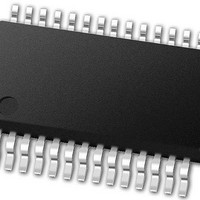PIC24FJ64GB002-I/SS Microchip Technology, PIC24FJ64GB002-I/SS Datasheet - Page 55

PIC24FJ64GB002-I/SS
Manufacturer Part Number
PIC24FJ64GB002-I/SS
Description
16-bit, 16 MIPS, 64KB Flash, 8KB RAM, Nanowatt XLP, USB OTG 28 SSOP .209in TUBE
Manufacturer
Microchip Technology
Specifications of PIC24FJ64GB002-I/SS
Processor Series
PIC24
Core
PIC24F
Data Bus Width
16 bit
Program Memory Type
Flash
Program Memory Size
64 KB
Data Ram Size
8192 B
Interface Type
I2C, SPI, UART
Maximum Clock Frequency
32 MHz
Number Of Programmable I/os
21
Number Of Timers
5
Operating Supply Voltage
2 V to 3.6 V
Maximum Operating Temperature
+ 85 C
Mounting Style
SMD/SMT
Package / Case
SSOP-28
Development Tools By Supplier
MPLAB Integrated Development Environment
Minimum Operating Temperature
- 40 C
Operating Temperature Range
- 40 C to + 85 C
Supply Current (max)
300 mA
Lead Free Status / Rohs Status
Lead free / RoHS Compliant
Available stocks
Company
Part Number
Manufacturer
Quantity
Price
Part Number:
PIC24FJ64GB002-I/SS
Manufacturer:
MICROCHIP/微芯
Quantity:
20 000
- Current page: 55 of 352
- Download datasheet (3Mb)
5.0
The PIC24FJ64GB004 family of devices contains
internal Flash program memory for storing and executing
application code. The memory is readable, writable and
erasable when operating with V
regulator is disabled, V
It can be programmed in four ways:
• In-Circuit Serial Programming™ (ICSP™)
• Run-Time Self-Programming (RTSP)
• Enhanced In-Circuit Serial Programming
ICSP allows a PIC24FJ64GB004 family device to be
serially programmed while in the end application circuit.
This is simply done with two lines for the programming
clock and programming data (which are named PGECx
and PGEDx, respectively), and three other lines for
power (V
This allows customers to manufacture boards with
unprogrammed devices and then program the micro-
controller just before shipping the product. This also
allows the most recent firmware or a custom firmware
to be programmed.
FIGURE 5-1:
2010 Microchip Technology Inc.
Note:
(Enhanced ICSP)
FLASH PROGRAM MEMORY
DD
), ground (V
This data sheet summarizes the features
of this group of PIC24F devices. It is not
intended to be a comprehensive reference
source. For more information, refer to the
“PIC24F
Section
(DS39715).
User/Configuration
Space Select
DDCORE
Family
ADDRESSING FOR TABLE REGISTERS
4.
SS
) and Master Clear (MCLR).
Using
Program
Counter
Using
Table
Instruction
“Program
must be over 2.25V.)
Reference
DD
over 2.35V. (If the
1/0
0
Memory”
Manual”,
TBLPAG Reg
8 Bits
PIC24FJ64GB004 FAMILY
Program Counter
24-Bit EA
24 Bits
RTSP is accomplished using TBLRD (table read) and
TBLWT (table write) instructions. With RTSP, the user
may write program memory data in blocks of 64 instruc-
tions (192 bytes) at a time and erase program memory
in blocks of 512 instructions (1536 bytes) at a time.
5.1
Regardless of the method used, all programming of
Flash memory is done with the table read and table
write instructions. These allow direct read and write
access to the program memory space from the data
memory while the device is in normal operating mode.
The 24-bit target address in the program memory is
formed using the TBLPAG<7:0> bits and the Effective
Address (EA) from a W register specified in the table
instruction, as shown in Figure 5-1.
The TBLRDL and the TBLWTL instructions are used to
read or write to bits<15:0> of program memory.
TBLRDL and TBLWTL can access program memory in
both Word and Byte modes.
The TBLRDH and TBLWTH instructions are used to read
or write to bits<23:16> of program memory. TBLRDH
and TBLWTH can also access program memory in Word
or Byte mode.
Working Reg EA
16 Bits
Table Instructions and Flash
Programming
0
Byte
Select
DS39940D-page 55
Related parts for PIC24FJ64GB002-I/SS
Image
Part Number
Description
Manufacturer
Datasheet
Request
R

Part Number:
Description:
Manufacturer:
Microchip Technology Inc.
Datasheet:

Part Number:
Description:
Manufacturer:
Microchip Technology Inc.
Datasheet:

Part Number:
Description:
Manufacturer:
Microchip Technology Inc.
Datasheet:

Part Number:
Description:
Manufacturer:
Microchip Technology Inc.
Datasheet:

Part Number:
Description:
Manufacturer:
Microchip Technology Inc.
Datasheet:

Part Number:
Description:
Manufacturer:
Microchip Technology Inc.
Datasheet:

Part Number:
Description:
Manufacturer:
Microchip Technology Inc.
Datasheet:

Part Number:
Description:
Manufacturer:
Microchip Technology Inc.
Datasheet:











